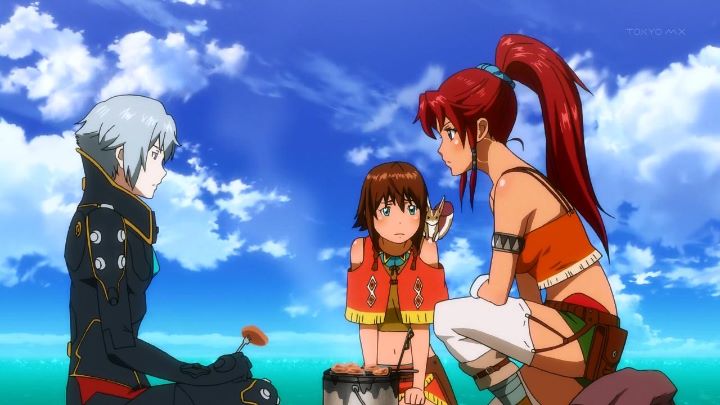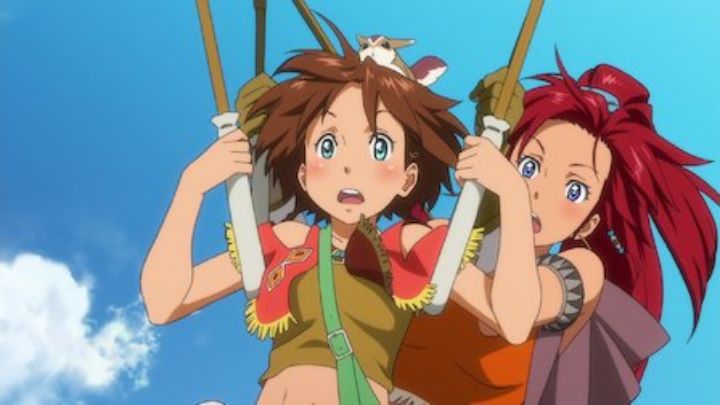






"Gargantia on the Verdurous Planet" is a rather horrible name for a science fiction anime. It doesn't mean anything significant to anyone who hasn't seen the show, and is difficult to remember and spell. To make this easier, I'll spoil off the top that "Gargantia" is the name of a giant fleet of ship vessels that a large population of humans calls home in this particular show. "Verdurous" is a word that means fresh or flourishing, which could symbolize the planet in question being of a healthy natural state, or of a person's memories and events on said planet being a fresh and new experience. Moving on..."Gargantia on the Verdurous Planet" is one of the more significant science fiction anime to come out of 2013. This wasn't necessarily due to the director or animation team (although both of are a fine pedigree in their own right), but because of the scenario writer (only being a hands-on writer for a couple of episodes, and acting as an overall supervisor for the rest) was Gen Urobuchi. Urobuchi's career as a writer exploded from 2011 onwards, being a driving force in the success behind shows such as "Puella Magi Madoka Magica," "Fate-Zero," and "Psycho-Pass," the three of which arguably being the most memorable classics of the 2010's decade. His popularity is largely due to his unflinching attitude towards horror and his appreciation for plot-twists, causing most of his stories to be rather horrific, but still something you immediately want to talk about with your friends after watching. Despite most of "Gargantia" not really accrediting Urobuchi, international fans watched the show purely because his name was attached at all, expecting a fascinating story with some surprises in store. This is also the main reason I intended to see the show, even though I am not a particularly invested fan of the science fiction genre. I had also intended to see the series on Bluray (the details and colors are deserving of it), but jumped the gun on a $10 DVD set being sold in Walmart. Certainly, for $10 you can't go wrong with this.The show starts off in a generic manner, but with enough directorial skill for me to be willing to sit through it. Like most other anime of this genre, it starts with humans piloting giant robots in space, shooting lasers against hordes of squid-like alien creatures amongst the cosmos. Ledo is one of these pilots, a skilled fighter without much of a personality: when he is told that he will be able to temporarily retire to "mate" after this last battle, he wonders if he even cares to do so. Shortly after the battle, Ledo's robot is struck out of commission, and he is kept in sleep mode until several months later. Flash forward to a planet covered in water, where a much less-advanced race of humans make their living on a series of metal floating ships, and where Ledo and his robot are recovered from the bottom of the sea. Initially hostile to each other (in an interesting choice, Ledo and the new race don't speak the same language, so Ledo relies on the aritificial intelligence inside his robot to communicate for most of the show), they agree to live together in peace, with Ledo trying to find a way back to his people in space while also trying to fit in and understand the customs of the local people. Also, this water planet happens to be Earth, the planet where humans originally came from long ago but escaped due to its growingly harsh climate: there is much backstory for Ledo to discover by the second half of the series.In the initial episodes, it is clear that this is an easy-going series of events that is more an excercise in world-building rather than story-development. With the help of a plucky messenger girl named Amy, Ledo slowly adapts to the floating city of Gargantia while struggling to grasp their way of life. They have families? They have fun in the sun when they aren't working? They use money to buy things they like? Ledo doesn't understand any of these things: they are considerd inefficient by his people and therefore are discarded. It is interesting to see the clash between two ideals, but the novelty wears thin before long. By the second half however, Ledo and some other crew members split off to a new part of the world, and here we get the opportunity for Ledo to uncover exactly what happened millenia ago to cause humans to leave and fight hordes of alien creatures. By this point, Gen Urobuchi's touch becomes more apparent, and we start getting plot twists in nearly every episode, shaking up everything we had originally thought in episodes prior. It's an exciting ride that makes the entire adventure seem a bit more worthwhile... ... at least, it would if the twists didn't seem so separate from the rest of the show. At times, it feels like multiple story ideas were combined into one for this production, and while they are each individually entertaining (either in a calming hopeful way or a gruseomely shocking way), the sum didn't live up to the value of its parts. And like most science fiction anime, I couldn't help but feel the world and setting was a little generic and lacking personality for me to latch on to. These affected my ability to enjoy the series wholeheartedly, even though I was paying close attention in the final few episodes. And it is a strange thing to suggest that the show lacks personality: the colorful world of Gargantia is vibrant with life. It is easy to throw around the idea that a nice-looking show evokes tones of Studio Ghibli or even Disney, but this is definitely true here. The character designs of Earth's remaining inhabitants are unique, although I don't know how I feel about the designs of the female characters; while it shies away from anything too graphic or sexual, many of the girls are drawn with the cuteness and energy of a chipmunk, and wear very little clothing. One of "Gargantia" 's initial villians is a nearly-nude and generously endowed pirate, and another scene features a well-animated belly-dance scene of the three lead girls that lasts for a few minutes. Sometimes, these design choices make sense to convey the freedom of life they enjoy compared to the clockwork efficiency Ledo is used to, but at other times it feels horribly out of place and inappropriate to the themes. The animation is better than most shows, but only just barely, and its strenghs don't really show until the more significant action scenes appear involving the robots, done in CGI but in an effective manner thanks to well-directed camera movement. The English dub is servicable, more so due to the smart script and choice to have multiple (made-up) languages. The music on the other hand is notably forgettable.There do exist many fans of all things science fiction, and I do think they will appreicate the setting and themes this show presents moreso than I. It is much more unique than the average sci-fi piece, and is executed with a careful tact that cannot be disregarded.
... at least, it would if the twists didn't seem so separate from the rest of the show. At times, it feels like multiple story ideas were combined into one for this production, and while they are each individually entertaining (either in a calming hopeful way or a gruseomely shocking way), the sum didn't live up to the value of its parts. And like most science fiction anime, I couldn't help but feel the world and setting was a little generic and lacking personality for me to latch on to. These affected my ability to enjoy the series wholeheartedly, even though I was paying close attention in the final few episodes. And it is a strange thing to suggest that the show lacks personality: the colorful world of Gargantia is vibrant with life. It is easy to throw around the idea that a nice-looking show evokes tones of Studio Ghibli or even Disney, but this is definitely true here. The character designs of Earth's remaining inhabitants are unique, although I don't know how I feel about the designs of the female characters; while it shies away from anything too graphic or sexual, many of the girls are drawn with the cuteness and energy of a chipmunk, and wear very little clothing. One of "Gargantia" 's initial villians is a nearly-nude and generously endowed pirate, and another scene features a well-animated belly-dance scene of the three lead girls that lasts for a few minutes. Sometimes, these design choices make sense to convey the freedom of life they enjoy compared to the clockwork efficiency Ledo is used to, but at other times it feels horribly out of place and inappropriate to the themes. The animation is better than most shows, but only just barely, and its strenghs don't really show until the more significant action scenes appear involving the robots, done in CGI but in an effective manner thanks to well-directed camera movement. The English dub is servicable, more so due to the smart script and choice to have multiple (made-up) languages. The music on the other hand is notably forgettable.There do exist many fans of all things science fiction, and I do think they will appreicate the setting and themes this show presents moreso than I. It is much more unique than the average sci-fi piece, and is executed with a careful tact that cannot be disregarded.